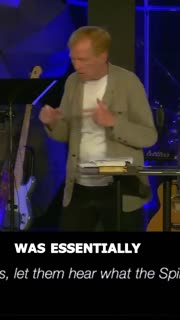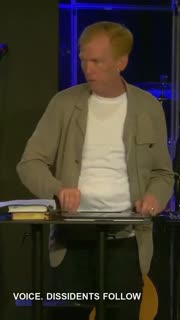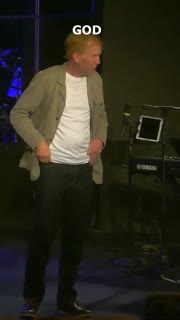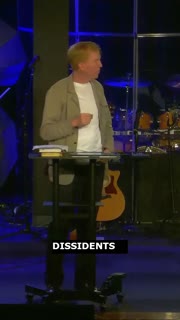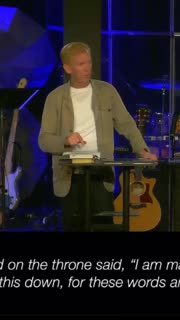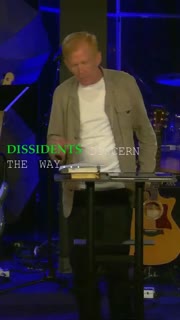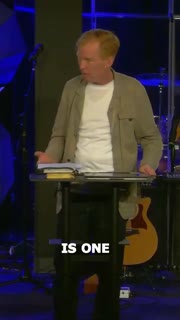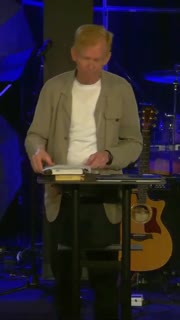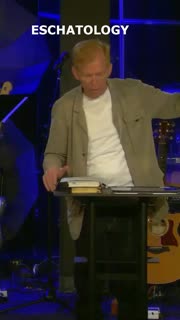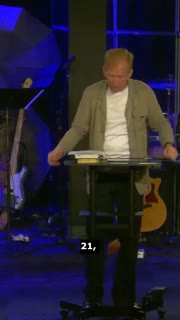Living as Dissidents: Embracing Hope in a Broken World
Devotional
Sermon Summary
Bible Study Guide
Sermon Clips
### Quotes for Outreach
1. "John was essentially encouraging the followers of Jesus in his day and in our day to be dissidents living in the world that they lived in. What is a dissident? A dissident, as we've discussed in this series so far, is a person of hope who imagines a better future. And then begins to embody that world. John is telling his readers, hearers, be a dissident, be a person of hope who imagines a better future, and then begins to embody that world where you live." [33:01] (44 seconds)
2. "Dissidents follow a different voice. This is part of what makes dissidents different is we follow a different voice. Think about it. If you listen to one particular news source over and over and over, that is going to shape your vision and your values and your priorities, right? That voice is going to shape how you see the world, how you see yourself, how you see the challenges. If you, for example, switched to a different media source and you started listening to an alternate, competing voice over and over and over, guess what? That would start to shape you as a person." [43:23] (48 seconds)
3. "Dissidents have a different allegiance, not to parties, but to the Lamb. Not to the donkey, not to the elephant, to the Lamb. So here's some startling statistics. A recent survey showed that 82% of Republicans think the Democrat Party has been taken over by socialists. 80% of Democrats think the Republican Party has been taken over by racists. 86% of Democrats think Trump encouraged white supremacy groups. 17% of Republicans agree with that. These numbers include Christians whose allegiance is often to something other than the Lamb." [51:23] (121 seconds)
4. "Dissidents live toward a different hope. Now, the academics, like the people who write all this fancy stuff, they have a term for talking about a vision for the end, like the first. For the future, right? And it's called eschatology. It's a fancy word. You don't need to worry about it. It's simply the study of things at the end. Like biology is a study of bios, life, right? Psychology is a study of psyche, the things in here, right? Eschatology is just a study of the eschaton, the end, right?" [01:01:44] (30 seconds)
5. "Dissidents believe that and say, oh, that's the future that God is going to bring about. That's what I hope for. And that's what I look forward to. Because we have that picture of the future, it shapes how we live now. If we believe that God is one day going to make all these things right, then it changes how we engage with the world. It changes how we think about our future. It changes how we think about the problems, knowing that one day God is going to make all this right." [01:04:23] (40 seconds)
### Quotes for Members
1. "Dissidents discern the way... The ways of Babylon. Now, that's a metaphor. We've talked about it in this series. It's a metaphor for empire. It's a metaphor for the kinds of systems of world dominance and governance that we all live in and always have and always will until Jesus finally comes back. So I want to talk briefly about how to discern. What are the hallmarks, if you will, of Babylon? How can we discern it? How can we recognize it?" [34:32] (32 seconds)
2. "Arrogance is one of the hallmarks of Babylon. This is part of what dissidents learn to do. Discern. But let me go on. Another one is economic exploitation. By the way, I'll probably irritate most of us today with some of the things that I have to say, so apologies in advance. And you can come up and have conversations with me later about it. Money and status are the love language of Babylon. Money and status are the love language of Babylon. The wealthy are considered virtuous because of their work ethic, and the poor are shamed for their quote-unquote lack of work ethic." [36:04] (57 seconds)
3. "Dissidents also have a different relationship with power. Let me talk about this for a minute. Instead of seeking political power, which is the way of Babylon, dissidents relate to power the way Jesus did. When Jesus was offered power, right, think of the temptation in the wilderness, he rejected it. He rejected the opportunity to use, to use power the way the world did. He's, right, he could have called on the angels, but he didn't. Now, Jesus had tremendous power, but he didn't use power over. Jesus used power for people." [01:00:17] (47 seconds)
4. "Christian eschatology turns us away from both progressivism and pessimism, not by denying progress or not by working to improve life and not by denying progress. Not by pretending harsh realities don't exist, but by trusting the God of promise who broke the power of death in the resurrection of the Lamb and who also promises that someday New Jerusalem will descend and justice will finally arrive on the earth." [01:03:04] (27 seconds)
5. "Revelation 21, starting in verse 2, right? Here's what John says. I saw the holy city, the new Jerusalem, coming down out of heaven from God, prepared as a bride, beautifully dressed for her husband. And I heard a loud voice from the throne saying, look, God's dwelling place is now among the people, and he will dwell with them. They will be his people, and God himself will be with them and be their God. He will wipe everything. Every tear from their eyes, there will be no more death or mourning or crying or pain, for the old order of things has passed away." [01:03:46] (33 seconds)
Ask a question about this sermon
1. "John was essentially encouraging the followers of Jesus in his day and in our day to be dissidents living in the world that they lived in. What is a dissident? A dissident, as we've discussed in this series so far, is a person of hope who imagines a better future. And then begins to embody that world. John is telling his readers, hearers, be a dissident, be a person of hope who imagines a better future, and then begins to embody that world where you live." [33:01] (44 seconds)
2. "Dissidents follow a different voice. This is part of what makes dissidents different is we follow a different voice. Think about it. If you listen to one particular news source over and over and over, that is going to shape your vision and your values and your priorities, right? That voice is going to shape how you see the world, how you see yourself, how you see the challenges. If you, for example, switched to a different media source and you started listening to an alternate, competing voice over and over and over, guess what? That would start to shape you as a person." [43:23] (48 seconds)
3. "Dissidents have a different allegiance, not to parties, but to the Lamb. Not to the donkey, not to the elephant, to the Lamb. So here's some startling statistics. A recent survey showed that 82% of Republicans think the Democrat Party has been taken over by socialists. 80% of Democrats think the Republican Party has been taken over by racists. 86% of Democrats think Trump encouraged white supremacy groups. 17% of Republicans agree with that. These numbers include Christians whose allegiance is often to something other than the Lamb." [51:23] (121 seconds)
4. "Dissidents live toward a different hope. Now, the academics, like the people who write all this fancy stuff, they have a term for talking about a vision for the end, like the first. For the future, right? And it's called eschatology. It's a fancy word. You don't need to worry about it. It's simply the study of things at the end. Like biology is a study of bios, life, right? Psychology is a study of psyche, the things in here, right? Eschatology is just a study of the eschaton, the end, right?" [01:01:44] (30 seconds)
5. "Dissidents believe that and say, oh, that's the future that God is going to bring about. That's what I hope for. And that's what I look forward to. Because we have that picture of the future, it shapes how we live now. If we believe that God is one day going to make all these things right, then it changes how we engage with the world. It changes how we think about our future. It changes how we think about the problems, knowing that one day God is going to make all this right." [01:04:23] (40 seconds)
### Quotes for Members
1. "Dissidents discern the way... The ways of Babylon. Now, that's a metaphor. We've talked about it in this series. It's a metaphor for empire. It's a metaphor for the kinds of systems of world dominance and governance that we all live in and always have and always will until Jesus finally comes back. So I want to talk briefly about how to discern. What are the hallmarks, if you will, of Babylon? How can we discern it? How can we recognize it?" [34:32] (32 seconds)
2. "Arrogance is one of the hallmarks of Babylon. This is part of what dissidents learn to do. Discern. But let me go on. Another one is economic exploitation. By the way, I'll probably irritate most of us today with some of the things that I have to say, so apologies in advance. And you can come up and have conversations with me later about it. Money and status are the love language of Babylon. Money and status are the love language of Babylon. The wealthy are considered virtuous because of their work ethic, and the poor are shamed for their quote-unquote lack of work ethic." [36:04] (57 seconds)
3. "Dissidents also have a different relationship with power. Let me talk about this for a minute. Instead of seeking political power, which is the way of Babylon, dissidents relate to power the way Jesus did. When Jesus was offered power, right, think of the temptation in the wilderness, he rejected it. He rejected the opportunity to use, to use power the way the world did. He's, right, he could have called on the angels, but he didn't. Now, Jesus had tremendous power, but he didn't use power over. Jesus used power for people." [01:00:17] (47 seconds)
4. "Christian eschatology turns us away from both progressivism and pessimism, not by denying progress or not by working to improve life and not by denying progress. Not by pretending harsh realities don't exist, but by trusting the God of promise who broke the power of death in the resurrection of the Lamb and who also promises that someday New Jerusalem will descend and justice will finally arrive on the earth." [01:03:04] (27 seconds)
5. "Revelation 21, starting in verse 2, right? Here's what John says. I saw the holy city, the new Jerusalem, coming down out of heaven from God, prepared as a bride, beautifully dressed for her husband. And I heard a loud voice from the throne saying, look, God's dwelling place is now among the people, and he will dwell with them. They will be his people, and God himself will be with them and be their God. He will wipe everything. Every tear from their eyes, there will be no more death or mourning or crying or pain, for the old order of things has passed away." [01:03:46] (33 seconds)
